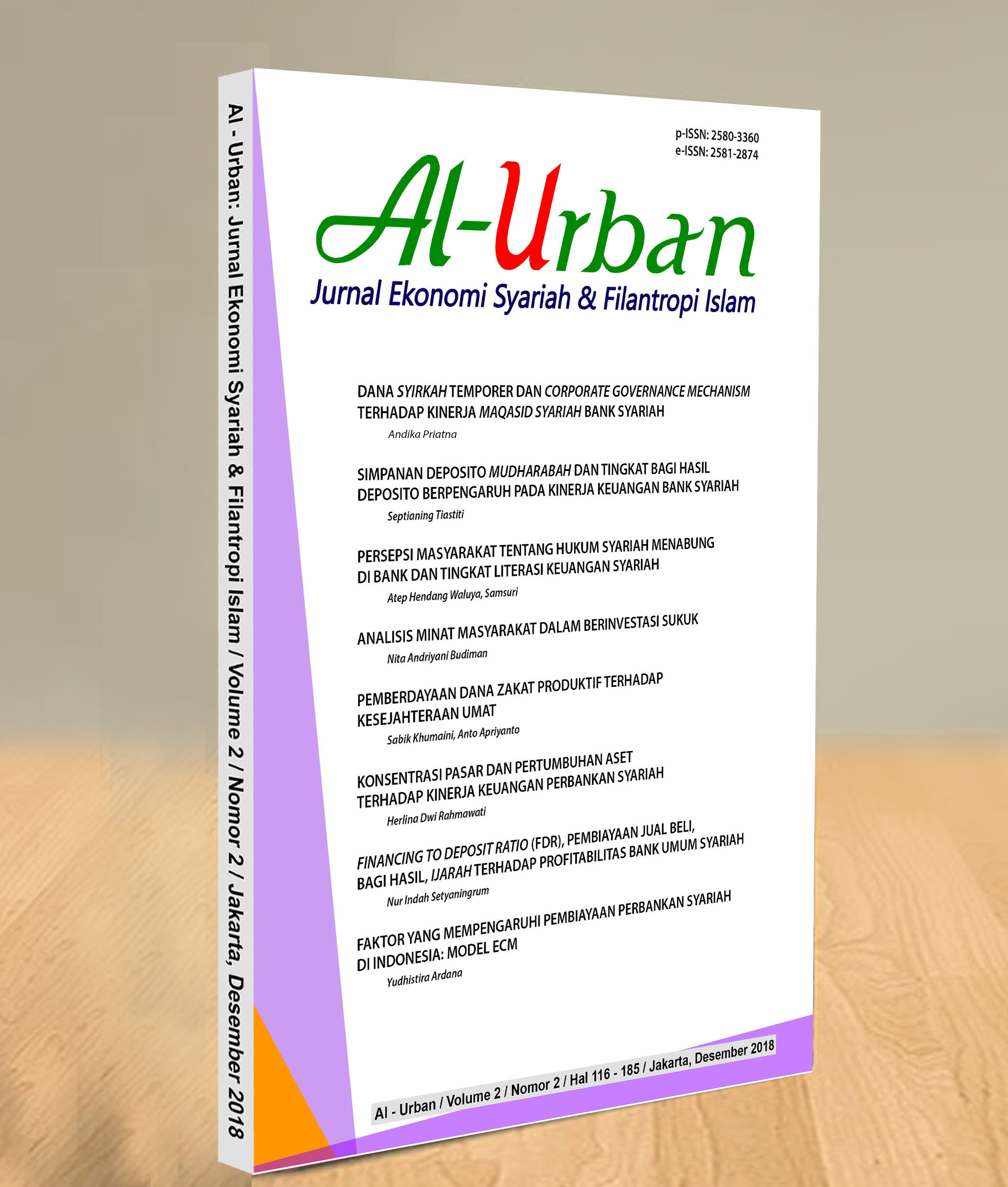Mengubah Arah Ekonomi Nasional: Potensi Ekonomi Syariah yang Tak Terbendung
DOI:
https://doi.org/10.22236/alurban_vol8.i2/18106Keywords:
Sharia Economy, Government Policy, Digital Technology, Financial Inclusion, Economic TransformationAbstract
The potential of the sharia economy in Indonesia, with a majority Muslim population, has a great opportunity to become the main driver of national economic growth. This study aims to analyze the main factors that drive the growth of the sharia economy, including government policies, public awareness, and adaptation of digital technology. Through qualitative research methods based on literature studies, it was found that strengthening regulations, technology-based product innovation, and sharia-based financial inclusion are key elements in building a sustainable sharia economic ecosystem. The government has a strategic role through policies such as the establishment of KNEKS, the merger of state-owned sharia banks, and the implementation of the Sharia KUR program. Although there are challenges such as limited infrastructure and low coordination between agencies, the implementation of the right strategy can optimize the potential of this sector. The results of the study show that collaboration between the financial sector, small and medium enterprises (SMEs), and the government is able to encourage the competitiveness of the Indonesian sharia economy at the global level, while contributing to an inclusive and sustainable national economic transformation.
Downloads
References
Andriyanto, Irsad. “Penguatan Daya Saing Usaha Mikro Kecil Menengah Melalui E-Commerce.” BISNIS : Jurnal Bisnis Dan Manajemen Islam 6, no. 2 (10 Januari 2019): 87–100. https://doi.org/10.21043/bisnis.v6i2.4709.
Aljufri, F. A. H. (2021). Pemberdayaan Ekonomi Masyarakat Dengan menggunakan Dana Zakat Melalui Pembiyaan Baznas Microfinance Desa Kabupaten Sigi Dalam Mensejahterakan Ekonomi Masyarakat. Al-Urban: Jurnal Ekonomi Syariah Dan Filantropi Islam, 5(2), 151–157. https://doi.org/10.22236/alurban_vol4/is1pp101-114
Apriyanti, Hani Werdi. “PERKEMBANGAN INDUSTRI PERBANKAN SYARIAH DI INDONESIA : ANALISIS PELUANG DAN TANTANGAN” 8, no. 1 (2017).
Aryanti, Wanda Eflinda, dan Muhammad Iqbal Fasa. “Analisis Strategi Pemasaran Bank Syariah Indonesia Dalam Menghadapi Persaingan Industri Keuangan,” no. 5 (2024).
Hikmah, L. S. (2024). Analisis Pengaruh Upah Minimum Provinsi, Jumlah UMKM dan Nilai Investasi UMKM Terhadap Penyerapan Tenaga Kerja di Provinsi Jawa Timur (Doctoral dissertation, UPN Veteran Jawa Timur).
Hakim, Muhammad Fajrul, dan Sugianto Sugianto. “Studi Library Research: Penguatan Ekosistem Halal Value Chain di Indonesia untuk Industri Halal Global.” Jurnal Penelitian Inovatif 4, no. 4 (28 Oktober 2024): 2227–38. https://doi.org/10.54082/jupin.787.
Hani Werdi Apriyanti, “PERKEMBANGAN INDUSTRI PERBANKAN SYARIAH DI INDONESIA : ANALISIS PELUANG DAN TANTANGAN” 8, no. 1 (2017): 2.
Iwan Setiawan, “PEMBIAYAAN UMKM, KINERJA BANK SYARIAH DAN PERTUMBUHAN EKONOMI DI INDONESIA,” Islamic Banking : Jurnal Pemikiran Dan Pengembangan Perbankan Syariah 6, no. 2 (5 Februari 2021): 2, https://doi.org/10.36908/isbank.v6i2.165.
Muhammad Rusydi Kadir, “SHARIAH COMPLIANCE PADA INVESTASI SUKUK DALAM SECURITIES CROWDFUNDING DI INDONESIA,” Jurnal Ilmu Perbankan Dan Keuangan Syariah 3, no. 1 (29 Juni 2021): 2, https://doi.org/10.24239/jipsya.v3i1.36.15-29.
Isabela, dan Muslihul Umam. “Optimalisasi Fintech Di Sektor Filantropi Islam Untuk Pengembangan ZISWAF.” Ekosiana Jurnal Ekonomi Syari Ah 7, no. 2 (29 November 2020): 75–85. https://doi.org/10.47077/ekosiana.v7i2.40.
Kadir, Muhammad Rusydi. “SHARIAH COMPLIANCE PADA INVESTASI SUKUK DALAM SECURITIES CROWDFUNDING DI INDONESIA.” Jurnal Ilmu Perbankan Dan Keuangan Syariah 3, no. 1 (29 Juni 2021): 16–29. https://doi.org/10.24239/jipsya.v3i1.36.15-29.
Nurrohmah, Resti Fadhilah, dan Radia Purbayati. “PENGARUH TINGKAT LITERASI KEUANGAN SYARIAH DAN KEPERCAYAAN MASYARAKAT TERHADAP MINAT MENABUNG DI BANK SYARIAH,” t.t.
Putra, Zulfadli Nugraha Triyan, dan Husni Thamrin. “PROBLEMATIKA DAN DINAMIKA PERBANKAN SYARIAH DI ERA GLOBALISASI.” Jurnal Tabarru’: Islamic Banking and Finance 5, no. 1 (2022): 34–40. https://doi.org/10.25299/jtb.2022.vol5(1).8448.
Riadhussyah, M. “Pengembangan Sumber Daya Manusia Di Bidang Wisata Halal Dalam Menghadapi Revolusi Industri 4.0.” Jurnal MSDA (Manajemen Sumber Daya Aparatur) 8, no. 1 (29 Juli 2020): 1–13. https://doi.org/10.33701/jmsda.v8i1.1164.
Saiyed, Rahmah. “Pengendalian Inflasi, Moneter Dan Fiskal Dalam Perspektif Ekonomi Makro Islam.” Jurnal Ilmiah Bongaya 5, no. 1 (30 Juni 2021): 42–49.
Sedyastuti, Kristina. “Analisis Pemberdayaan UMKM Dan Peningkatan Daya Saing Dalam Kancah Pasar Global.” INOBIS: Jurnal Inovasi Bisnis dan Manajemen Indonesia 2, no. 1 (31 Juli 2018): 117–27. https://doi.org/10.31842/jurnal-inobis.v2i1.65.
Setiawan, Iwan. “PEMBIAYAAN UMKM, KINERJA BANK SYARIAH DAN PERTUMBUHAN EKONOMI DI INDONESIA.” Islamic Banking : Jurnal Pemikiran Dan Pengembangan Perbankan Syariah 6, no. 2 (5 Februari 2021): 263–78. https://doi.org/10.36908/isbank.v6i2.165.
SP49-Kebijakan-Fiskal-2024-Diarahkan-untuk-Mempercepat-Transformasi-Ekonomi-yang-Inklusif-dan-Berkelanjutan.pdf.” Diakses 8 Desember 2024. https://media.kemenkeu.go.id/getmedia/2581e5fe-ba4c-4555-b775-24e3f71dc058/SP49-Kebijakan-Fiskal-2024-Diarahkan-untuk-Mempercepat-Transformasi-Ekonomi-yang-Inklusif-dan-Berkelanjutan?ext=.pdf.
Trisasmita, R. (2018). Faktor-Faktor Yang Mempengaruhi Islamic Governance Perbankan Syariah Di Indonesia.
Wanda Eflinda Aryanti dan Muhammad Iqbal Fasa, “Analisis Strategi Pemasaran Bank Syariah Indonesia Dalam Menghadapi Persaingan Industri Keuangan,” no. 5 (2024): 2.
Downloads
Published
How to Cite
Issue
Section
License
Copyright (c) 2024 Al-Urban: Jurnal Ekonomi Syariah dan Filantropi Islam

This work is licensed under a Creative Commons Attribution 4.0 International License.
The Author submiting a manuscript do so on the understanding thet if accepted for publication, copyright of the article shall be assigned to Al-Urban: Jurnal Ekonomi Syariah dan Filantropi Islam, Faculty of Economics and Business, University of Muhammadiyah Prof. DR. HAMKA.
Copyright encompasses exclusive right to reproduse and deliver the article in all form and media, including reprint, photographs, microfilms and any other similar reproductions, as well as transalations. The reproduction of any part of this journal., its storage in database and its transmission by any form or media such as electronic, electrostatic and mechanical copies, photocopies, recordings, magnetic media, etc..will be









